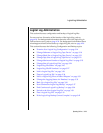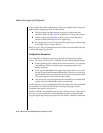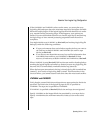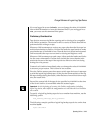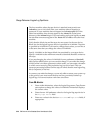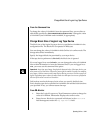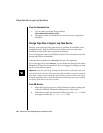
Operating OnLine 3-15
Examine Your Logical Log Configuration
Freeing the Logical Log Files
The operator should monitor backed-up logical log files to ensure that they
are being freed (released for reuse) in a timely manner. Even a backed-up log
file cannot be freed (its status remains unreleased) if it contains records
belonging to an open transaction. (Refer to page 3-26 for more information
about log file status.)
If OnLine attempts to switch to the next logical log file and finds that the next
log file in sequence is unreleased (status displays as
U), OnLine immediately
suspends all processing. Even if other logical log files are free and available,
OnLine cannot skip an unreleased file and write to another, free file.
OnLine must suspend processing when it encounters an unreleased, backed-
up log file to protect the data within the log file. If the log file is backed-up
but not free, a transaction within the log file is still open. If the open trans-
action is eventually rolled back, the data within the log is critically important
for the roll back operation. Refer to page 3-39 for more information about
freeing a logical log file.
Verify the Size and Number of Files
The logical log files contain five types of records:
■ SQL data definition statements for all databases
■ Record of a checkpoint
■ Record of a change to the configuration
■ SQL data manipulation statements for databases that were created
with logging
■ Record of a change to the logging status of a database
The logical log files receive the first three types of records during processing
even if no databases are created with transaction logging.
Total space allocated to the logical log files is equal to the number of logical
log files multiplied by the size of each log (LOGFILES x LOGSIZE) as specified
in the configuration file.









